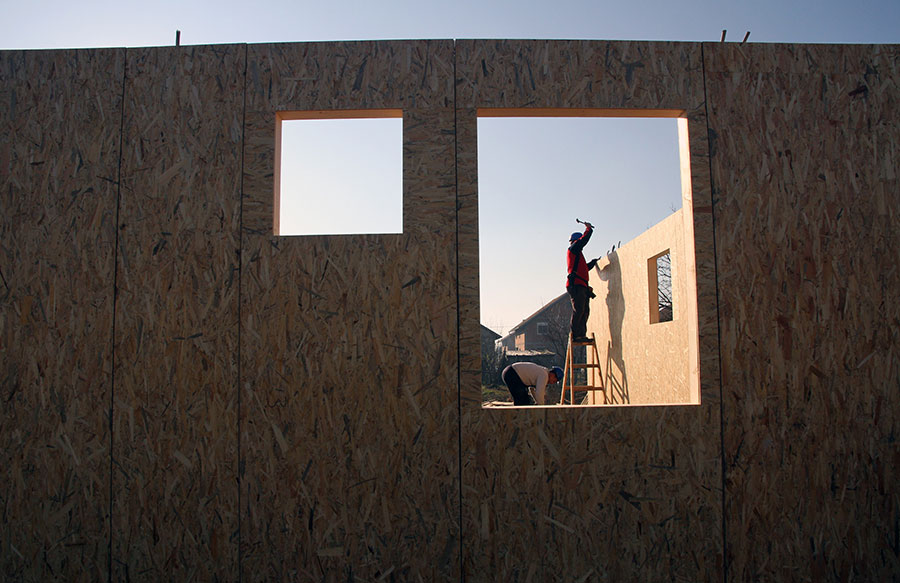In 2015, over 200 families in Serbia, BiH, Croatia and Montenegro obtained roof over their heads thanks to Regional Housing Programme (RHP). The aim is to support refugee families and internally displaces persons who have not had durable housing solutions for more than 20 years.
The Programme, which kicked off at the donor conference in Sarajevo on 24 April 2012, has received support from several international organisations and countries, with the biggest donor being the European Union. On that occasion, European Commission pledged to give EUR230 out of EUR261 million to the Regional Housing Programme Fund.

Miljka Petrovic, Indjija – Reconstruction of the family house
The implementation of Programme in Serbia included the provision of construction material to the most vulnerable refugee families. The RHP is expected to provide durable housing solutions to refugees and support more than 16,780 households.
Apart from the EU, the USA also stands as one of the key partners, whereas the UNHCR and the OSCE Mission to Serbia are tasked with the monitoring of the beneficiaries selection process, viability aspects and the applied protection measures.
Danijela Popovic Roko of the Commissariat for Refugees and Migration of the Republic of Serbia said in November 2014 “we have envisaged four components of the Programme according to our beneficiaries needs: provision of construction material, provision of prefabricated houses, purchase of rural houses and the construction of apartments in the following amount: 10,000 apartments, 4,000 packages of construction material, 1,500 prefabricated houses and some 1,500 rural houses.”
Over the past two years, the progress has been made in the implementation of this Programme in Serbia. In 2015 alone, thanks to EUR2 million, 129 packages of construction material have been provided, each worth EUR9,000, thanks to which the families managed to complete the construction of their houses.
2,000 More Housing Solutions to Go
On 31 October 2015, the Serbian National Theatre hosted the handing over of the contracts to representatives of 61 towns/municipalities where apartments are to be built, construction material provided and housing solutions granted to refugees from Bosnia and Herzegovina and Croatia, through grants for the purchase of rural houses. This assistance comes within the Regional Housing Programme of the Republic of Serbia.

Photo exhibit at the official signature of agreements with municipalities, Novi Sad
The Programme is funded by the EU, being the biggest donor, the USA, Germany, Italy, Norway, Switzerland, Denmark, Turkey, Luxembourg, Cyprus, Romania, Czech Republic, Slovakia and Hungary, with the support from the OSCE and UNHCR.
The contracts were officially presented by Ivica Dacic Foreign Affairs Minister/ First Deputy Prime Minister/President of Commission for the coordination of process of sustainable integration of refugees.
“Today’s contracts provide housing solutions to 2,000 families. The Programme is worth EUR47.5 million,” Dacic said and added that the refugees from Croatia and Bosnia and Herzegovina will receive construction material or provided with grants for the purchase of rural houses in Serbia.
On this occasion, Head of the EU Delegation to Serbia Michael Davenport said the event marked an important step in the implementation of Regional Housing Programme and showed that people who had lost their homes in conflicts in former Yugoslavia were not forgotten.
“I am very pleased to see the progress in the implementation of projects and the fact that shorty, we will see tangible results in the form of 2,000 new housing solutions for people who have been waiting for such solutions for more than 20 years. The EU continues to be the biggest partner and donor to Serbia and other countries of the Western Balkans in solving the problem of refugees and IDPs,” Davenport said.

October 31, 2015 – Ivica Dacic Serbian Foreign Affairs Minister, and President of the Government Commission for Coordination of the Permanent Integration Process of Refugees handed agreements over to 61 towns/municipalities representatives during the official ceremony in Novi Sad
He reminded that once there were more than 300 collective centres in Serbia, whereas today, ten remain, accommodating some 1,000 people, and pointed out that the EU helped Serbia to find proper housing solutions for refugees and close collective centres.
Davenport also said that the EU was the biggest donor to the Regional Housing Programme and allocated EUR74 million to support refugees in Serbia since 2000.




